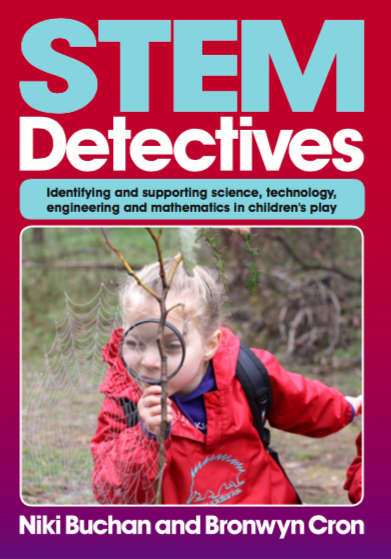- PROFESSIONAL DEVELOPMENT
- >
- REFERENCE BOOKS
- >
- STEM Detectives - Lots of innovative, practical ideas. identifying the STEM in play
STEM Detectives - Lots of innovative, practical ideas. identifying the STEM in play
SKU:
BSTEM
A$49.95
A$49.95
Unavailable
per item
STEM Detectives - Identifying and supporting science, technology, engineering and mathematics in children's play
STEM Detectives is a practical photographic resource to encourage and guide educators to identify the STEM – science, technology, engineering and mathematics – happening in children’s play, as well as develop the skills and understanding to support and encourage a deeper level of STEM exploration and discovery. It offers advice about the role of adults play in supporting the development of STEM thinking, along with ideas about environments and resources to promote play that encourages engagement and creativity.
PAGES: 95 | AGES: 0-6 | PUBLISHED: September 2018
ISBN: 9781925145304
4 available
onday, 27 August 2018Thriving in a Changing World
Today’s children will inhabit a challenging, fast-changing world. Encouraging STEM thinking empowers them with the skills to live well, say co-authors of STEM Detectives, Niki Buchan and Bronwyn Cron.
“As the world moves and changes at an ever-increasing pace, STEM thinking provides our children with the skills to not only survive but also to thrive,” Niki says.
The acronym STEM stands for science, technology, engineering and mathematics in children’s play. It refers to creative problem-solving, resilience, innovation, critical thinking, analysing data and information, and imagination.
Bronwyn agrees that a play-based approach to STEM means children are more deeply engaged and self-motivated, and their formative STEM experiences are positive.
“This goes a long way to sparking an ongoing interest in further developing STEM thinking skills and perhaps pursuing STEM learning and career options.”
Children naturally notice, observe, question, investigate, hypothesise and experiment as they explore and play. To identify these STEM behaviours, adults need to sit back, observe and fully tune in to children’s conversations and thinking – using a STEM detective’s lens.
Adults don’t need to ‘teach’ STEM in the early years, Niki says.
“Adults provide a rich environment and share the children’s awe and wonder as they explore this wonderful and exciting world they find themselves in. The adult is the mentor and guide, the children are the scientists.”
The key is to provide children with time, space and loose parts, she says.
If children are given large periods of uninterrupted time to play with objects and resources that don’t have a set purpose and that they can change and manipulate in any way they choose, children will naturally explore complex STEM thinking and concepts.
“Ignite the fire of curiosity and wonder. That is, after all, what drives lifelong learning,” says Bronwyn.
STEM Detectives is designed to encourage and guide educators to identify the STEM happening in children’s play, as well as develop the skills and understanding to support and encourage a deeper level of exploration and discovery. Posted by Essential Resources
Today’s children will inhabit a challenging, fast-changing world. Encouraging STEM thinking empowers them with the skills to live well, say co-authors of STEM Detectives, Niki Buchan and Bronwyn Cron.
“As the world moves and changes at an ever-increasing pace, STEM thinking provides our children with the skills to not only survive but also to thrive,” Niki says.
The acronym STEM stands for science, technology, engineering and mathematics in children’s play. It refers to creative problem-solving, resilience, innovation, critical thinking, analysing data and information, and imagination.
Bronwyn agrees that a play-based approach to STEM means children are more deeply engaged and self-motivated, and their formative STEM experiences are positive.
“This goes a long way to sparking an ongoing interest in further developing STEM thinking skills and perhaps pursuing STEM learning and career options.”
Children naturally notice, observe, question, investigate, hypothesise and experiment as they explore and play. To identify these STEM behaviours, adults need to sit back, observe and fully tune in to children’s conversations and thinking – using a STEM detective’s lens.
Adults don’t need to ‘teach’ STEM in the early years, Niki says.
“Adults provide a rich environment and share the children’s awe and wonder as they explore this wonderful and exciting world they find themselves in. The adult is the mentor and guide, the children are the scientists.”
The key is to provide children with time, space and loose parts, she says.
If children are given large periods of uninterrupted time to play with objects and resources that don’t have a set purpose and that they can change and manipulate in any way they choose, children will naturally explore complex STEM thinking and concepts.
“Ignite the fire of curiosity and wonder. That is, after all, what drives lifelong learning,” says Bronwyn.
STEM Detectives is designed to encourage and guide educators to identify the STEM happening in children’s play, as well as develop the skills and understanding to support and encourage a deeper level of exploration and discovery. Posted by Essential Resources
